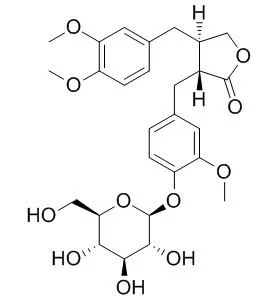| Kinase Assay: |
| J Inflamm (Lond). 2011 Jul 7;8(1):16. | | Anti-inflammatory function of arctiin by inhibiting COX-2 expression via NF-κB pathways.[Pubmed: 21733191 ] | Arctiin, isolated from Forsythia suspensa has been reported to have anti-inflammatory, anti-oxidant, antibacterial, and antiviral effects in vitro. However, there has been a lack of studies regarding its effects on immunological activity. The aim of this study is to investigate the anti-inflammatory potential and possible mechanisms of Arctiin in LPS-induced macrophages.
METHODS AND RESULTS:
We investigated the mRNA and protein levels of proinflammatory cytokines through RT-PCR and western blot analysis, followed by a FACS analysis for surface molecule changes.
Arctiin dose dependently decreased the production of NO and proinflammatory cytokines such as IL-1β, IL-6, TNF-α, and PGE2, and it reduced the gene and protein levels as determined by RT-PCR and western blot analysis, respectively. The expression of co-stimulatory molecules such as B7-1 and B7-2 were also inhibited by Arctiin. Furthermore, the activation of the nuclear transcription factor, NF-κB in macrophages was inhibited by Arctiin.
CONCLUSIONS:
Taken together these results provide evidence of the bioactivity of Arctiin in inflammatory diseases and suggest that Arctiin may exert anti-inflammatory effect by inhibiting the pro-inflammatory mediators through the inactivation of NF-kB. |
|
| Cell Research: |
| Mol Med Rep. 2014 Sep;10(3):1363-70. | | Photoprotective effect of arctiin against ultraviolet B-induced damage in HaCaT keratinocytes is mediated by microRNA expression changes.[Pubmed: 24926940] | Human keratinocytes are located in the outermost skin layer and thus particularly vulnerable to ultraviolet B (UVB) radiation exposure. Previous studies have focused on the cellular and molecular perspectives of UVB-induced keratinocyte damage.
METHODS AND RESULTS:
In the present study, it was demonstrated that pretreatment with the phytochemical Arctiin, one of the lignin compounds, protects human HaCaT keratinocytes from UVB-mediated damage. Biochemical assays revealed that UVB-induced cytotoxicity and cell death were significantly reduced in Arctiin-pretreated HaCaT cells. In addition, Arctiin promoted the wound healing and DNA repair properties of keratinocytes. The photoprotective effects of Arctiin were associated with changes in the expression levels of specific microRNAs (miRNAs) in HaCaT cells. A bioinformatics analysis demonstrated that the miRNAs were functionally involved in cancer, cell cycle, and Wnt and mitogen-activated protein kinase signaling pathways.
CONCLUSIONS:
In the present study, the results from the cellular and molecular assays demonstrated a novel role for Arctiin in UVB protection in keratinocytes, which is mediated by miRNA responses and the suppression of UVB-induced cell death. Furthermore, Arctiin is implicated as a potential chemopreventive agent through UVB protection of keratinocytes. | | Oncol Rep. 2008 Mar;19(3):721-7. | | Arctiin induces cell growth inhibition through the down-regulation of cyclin D1 expression.[Pubmed: 18288407] | Arctiin is a major lignan constituent of Arctium lappa and has anti-cancer properties in animal models. It was recently reported that Arctiin induces growth inhibition in human prostate cancer PC-3 cells. However, the growth inhibitory mechanism of Arctiin remains unknown.
METHODS AND RESULTS:
Herein we report that Arctiin induces growth inhibition and dephosphorylates the tumor-suppressor retinoblastoma protein in human immortalized keratinocyte HaCaT cells. We also show that the growth inhibition caused by Arctiin is associated with the down-regulation of cyclin D1 protein expression. Furthermore, the Arctiin-induced suppression of cyclin D1 protein expression occurs in various types of human tumor cells, including osteosarcoma, lung, colorectal, cervical and breast cancer, melanoma, transformed renal cells and prostate cancer. Depletion of the cyclin D1 protein using small interfering RNA-rendered human breast cancer MCF-7 cells insensitive to the growth inhibitory effects of Arctiin, implicates cyclin D1 as an important target of Arctiin.
CONCLUSIONS:
Taken together, these results suggest that Arctiin down-regulates cyclin D1 protein expression and that this at least partially contributes to the anti-proliferative effect of Arctiin. |
|
| Animal Research: |
| Int Immunopharmacol. 2014 Dec;23(2):505-15. | | Arctigenin but not arctiin acts as the major effective constituent of Arctium lappa L. fruit for attenuating colonic inflammatory response induced by dextran sulfate sodium in mice.[Pubmed: 25284342] | The crude powder of the fruit of Arctium lappa L. (ALF) has previously been reported to attenuate experimental colitis in mice. But, its main effective ingredient and underlying mechanisms remain to be identified. In this study, ALF was extracted with ethanol, and then successively fractionated into petroleum ether, ethyl acetate, n-butanol and water fraction.
METHODS AND RESULTS:
Experimental colitis was induced by dextran sulfate sodium (DSS) in mice.
Among the four fractions of ALF, the ethyl acetate fraction showed the most significant inhibition of DSS-induced colitis in mice. The comparative studies of arctigenin and Arctiin (the two main ingredients of ethyl acetate fraction) indicated that arctigenin rather than Arctiin could reduce the loss of body weight, disease activity index and histological damage in the colon. Arctigenin markedly recovered the loss of intestinal epithelial cells (E-cadherin-positive cells) and decreased the infiltration of neutrophils (MPO-positive cells) and macrophages (CD68-positive cells). Arctigenin could down-regulate the expressions of TNF-α, IL-6, MIP-2, MCP-1, MAdCAM-1, ICAM-1 and VCAM-1 at both protein and mRNA levels in colonic tissues. Also, it markedly decreased the MDA level, but increased SOD activity and the GSH level. Of note, the efficacy of arctigenin was comparable or even superior to that of the positive control mesalazine. Moreover, it significantly suppressed the phosphorylation of MAPKs and the activation of NF-κB, including phosphorylation of IκBα and p65, p65 translocation and DNA binding activity.
CONCLUSIONS:
In conclusion, arctigenin but not Arctiin is the main active ingredient of ALF for attenuating colitis via down-regulating the activation of MAPK and NF-κB pathways. |
|






 Cell. 2018 Jan 11;172(1-2):249-261.e12. doi: 10.1016/j.cell.2017.12.019.IF=36.216(2019)
Cell. 2018 Jan 11;172(1-2):249-261.e12. doi: 10.1016/j.cell.2017.12.019.IF=36.216(2019) Cell Metab. 2020 Mar 3;31(3):534-548.e5. doi: 10.1016/j.cmet.2020.01.002.IF=22.415(2019)
Cell Metab. 2020 Mar 3;31(3):534-548.e5. doi: 10.1016/j.cmet.2020.01.002.IF=22.415(2019) Mol Cell. 2017 Nov 16;68(4):673-685.e6. doi: 10.1016/j.molcel.2017.10.022.IF=14.548(2019)
Mol Cell. 2017 Nov 16;68(4):673-685.e6. doi: 10.1016/j.molcel.2017.10.022.IF=14.548(2019)